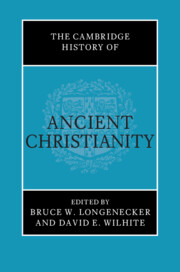Book contents
- The Cambridge History of Ancient Christianity
- The Cambridge History of Ancient Christianity
- Copyright page
- Contents
- Figures
- List of Contributors
- Editors’ Preface
- Part I Contested Contexts
- Part II Contested Figures
- Part III Contested Heritage
- Part IV Contested Cultures
- Part V Contested Beliefs
- 19 Contesting Creator and Creation
- 20 The Trinity in the Making
- 21 Resurrection, Transformation, and Deification
- 22 The Eucharist in the First Three Centuries
- 23 Office, and Appointment to Office, in Early Christian Circles
- Part VI Contested Bodies
- Ancient Sources
- Modern Authors
- References
19 - Contesting Creator and Creation
from Part V - Contested Beliefs
Published online by Cambridge University Press: 23 August 2023
- The Cambridge History of Ancient Christianity
- The Cambridge History of Ancient Christianity
- Copyright page
- Contents
- Figures
- List of Contributors
- Editors’ Preface
- Part I Contested Contexts
- Part II Contested Figures
- Part III Contested Heritage
- Part IV Contested Cultures
- Part V Contested Beliefs
- 19 Contesting Creator and Creation
- 20 The Trinity in the Making
- 21 Resurrection, Transformation, and Deification
- 22 The Eucharist in the First Three Centuries
- 23 Office, and Appointment to Office, in Early Christian Circles
- Part VI Contested Bodies
- Ancient Sources
- Modern Authors
- References
Summary
Investigating Greco-Roman intellectual culture in the first three centuries of the Common Era, the historian looks in vain for a consolidated or thoroughly well-defined “Christian cosmology,” or a fully agreed-upon doctrine of creation. Indeed, as Christian apologists and theologians of the pre-Nicene age entered in earnest into the fray of long-standing philosophical debates over the nature of the universe, they had no antecedent interpretive synthesis of biblical sources on creation, though some consulted Hellenistic-Jewish writings while others willingly accessed doxographies containing the abbreviated opinions of the philosophical sages, or else read their works directly. More than one alternative, it seems, lay open to early-generation Christian thinkers. They could attempt to start from scratch with the biblical sources (including the gradually emerging New Testament writings) in constructing a Christian understanding of the cosmos that, in fideistic fashion, thoroughly ignored or circumvented traditions of Greco-Roman cosmology. Or, on the other hand, they could surrender to the fact that their sacred scriptures were not preoccupied with problems of theoretical cosmology and turn exclusively to other more immediate concerns of human salvation and the gospel of the eschatological “new creation.” Or, for better or worse, representing a religious faith having no philosophical past or pedigree solely to call its own, these pioneering Christian intellectuals could venture a critical but constructive engagement with the revered classical and Hellenistic authorities, staking out the philosophical plausibility of a distinctly Christian cosmology – all the more importantly since sophisticated pagan speculation about the god–world relation and the nature of the cosmos enjoyed resurgences well into the Byzantine age.
- Type
- Chapter
- Information
- The Cambridge History of Ancient Christianity , pp. 445 - 465Publisher: Cambridge University PressPrint publication year: 2023



